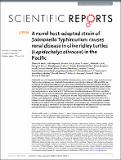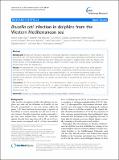Browsing Facultad de Ciencias de la Salud by Author "Gonzalez-Barrientos, Rocio"
Now showing items 1-2 of 2
-
A novel host-adapted strain of Salmonella Typhimurium causes renal disease in olive ridley turtles (Lepidochelys olivacea) in the Pacific
Thierry, Work; Dagenais, Julie; Stacy, Brain; Ladner, Jason; Lorch, Jeffrey; Balazs, George; BARQUERO-CALVO, ELIAS; Breeden, Renee; Corrales Gómez, Natalia; Berlowski-Zier, Brenda; Gonzalez-Barrientos, Rocio; Harris, Heather; Hernández-Mora, Gabriela; Herrera-Ulloa, Ángel; Hesami, Shoreh; Jones, Todd; Morales, Juan Alberto; Norton, Terry M.; Rameyer, Robert A.; Taylor, Daniel; Waltzek, Thomas (Springer Nature, 2019-06-27)Salmonella spp. are frequently shed by wildlife including turtles, but S. enterica subsp. enterica serovar Typhimurium or lesions associated with Salmonella are rare in turtles. Between 1996 and 2016, we necropsied 127 ... -
Brucella ceti infection in dolphins from the Western Mediterranean sea
Guzman-Verri, Caterina; Isidoro Ayza, Marcos; Ruiz-Villalobos, Nazareth; Pérez, Lola; Muñoz, Pilar M.; Alegre, Fernando; Barberán, Montserrat; Chacón-Díaz, Carlos; Chaves-Olarte, Esteban; Gonzalez-Barrientos, Rocio; Moreno, Edgardo; Blasco, José María; Domingo, Mariano (Frontiers in cellular and infection microbiology, 2012)Background: Brucella ceti infections have been increasingly reported in cetaceans. Brucellosis in these animals is associated with meningoencephalitis, abortion, discospondylitis', subcutaneous abscesses, endometritis and ...


